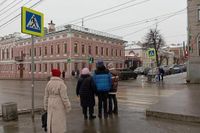In an effort to create a better work-life balance for its citizens, the Ministry of Labor of Russia has unveiled a revamped holiday schedule for 2025. This new calendar is set to significantly reshape the yearly calendar of official holidays, with a special focus on improving public holidays. According to reports from DEITA.RU, the major highlight is the splitting of the traditional May holidays into two segments to celebrate both the Day of Spring and Labor as well as Victory Day.
The Russian Ministry of Labor has specifically noted that the May holidays will now be observed in two separate phases: from May 1 to May 4 and from May 8 to May 11. By making this adjustment, officials believe they can promote a more significant festive mood surrounding both holidays and allow citizens the necessary time to properly celebrate. This change is set to become effective in 2025, providing citizens with a structured approach to both work and leisure.
For the beginning of the year, the New Year holiday period has been fixed from January 1 to January 7, traditionally the longest rest duration at the start of the year. This is followed by the Defender of the Fatherland Day celebrations on February 22 and 23, providing citizens with another opportunity to enjoy time off. Women's Day on March 8, along with March 9, will also grant additional public holidays, allowing citizens to further enjoy a long weekend.
Looking ahead into the early summer, Russia Day will be celebrated from June 12 to June 15, effectively granting four straight days off. Additionally, National Unity Day, scheduled for November 2 to November 4, will provide citizens with three days off in the fall. Furthermore, December 31 will once again be designated as a non-working day, facilitating a smoother transition into the New Year celebrations.
The Ministry of Labor has recognized that these changes will enable citizens to effectively plan their leisure activities and work commitments, creating a more dynamic life approach. In light of this, there is also consideration of shifting some holidays in the calendar to potentially extend the break periods and promote an even greater comfort in taking time off work. Officials point out that these adjustments are designed to enhance the overall quality of life for Russian citizens by providing more opportunities for meaningful rest and recovery throughout the year.
Notably, the impact of these changes is expected to ripple throughout various sectors of daily life, influencing not only personal schedules but also workplace dynamics across the nation. Significant discussions about these changes have sparked reactions from labor advocates who see potential in these adjustments to improve workers' overall happiness and productivity. As reported, according to a spokesperson from the Ministry, “These changes can significantly enhance the quality of life for people by providing more opportunities for a full recovery during the year.”
The restructuring of the holiday calendar reflects broader trends in labor rights and work-life balance discussions around the world. Many people across the globe advocate for policies that recognize the importance of downtime and leisure in enhancing productivity and well-being. These shifts could prompt additional reforms and might inspire other countries to also evaluate their work schedules and public holiday planning.
As Russia approaches this new holiday framework, discussions are ongoing concerning any further potential changes that could arise. Will these adjustments truly bring about the desired impact on societal well-being and productivity? Time will tell as the country prepares to navigate this new landscape of public holidays.





